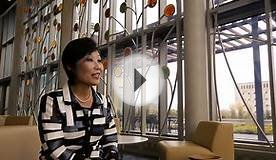UW School of Human Ecology
 Uniquely and artfully designed by Wei Dong, University of Wisconsin-Madison Professor of Interior Architecture, Harmonious Spaces is an experiential exhibition that immerses visitors in a multi-sensory, spatial experience of feng shui. Directed paths of travel incorporate material, forms, sounds and colors that engage the senses and enhance understanding of the principles of feng shui. A series of Professor Dong’s paintings inspired by these principles is also on display in the gallery.
Uniquely and artfully designed by Wei Dong, University of Wisconsin-Madison Professor of Interior Architecture, Harmonious Spaces is an experiential exhibition that immerses visitors in a multi-sensory, spatial experience of feng shui. Directed paths of travel incorporate material, forms, sounds and colors that engage the senses and enhance understanding of the principles of feng shui. A series of Professor Dong’s paintings inspired by these principles is also on display in the gallery.
Opening Reception
2:30-3:30 & 4:30-5:30 | HLATC Classroom Textile Display Open for Harmonious Spaces Reception In conjunction with the opening celebration of a selection of historical Chinese garments and textiles will be on display to the public in the HLATC classroom.
3:00- 4:00 | The Art and Cosmology of Feng Shui: A Conversation Featuring UW-Madison faculty and staff Dr. Wei Dong (Interior Architect, Design Studies), Dr. Joe Dennis (Historian, Ming Dynasty China), Dr. Terry Boyd (Architectural Historian), and Dr. Sherry Harlacher (Asian Art Historian and Director, School of Human Ecology’s Center for Textiles and Design).
4:00-4:25 | Chinese Traditional Dance Performance
4:25-5:30 | Reception Catering by Grand China Restaurant
Open Gallery Night
This immersive, multisensory experience allows visitors to gain deeper appreciation for feng shui. In celebration of, this event will include a painting demonstration from 7-7:30.
Traditional Chinese Brush Painting: A Hands-On Lesson and Demonstration for Children and the Young-at-Heart
Join UW Design Studies Graduate students in exploring traditional Chinese brush painting, a hands-on lesson and demonstration for children and the young-at-heart. Current open lessons start 4:00 and 4:30. RSVP required.

